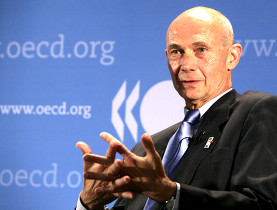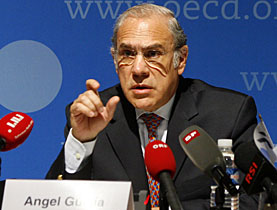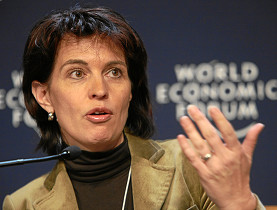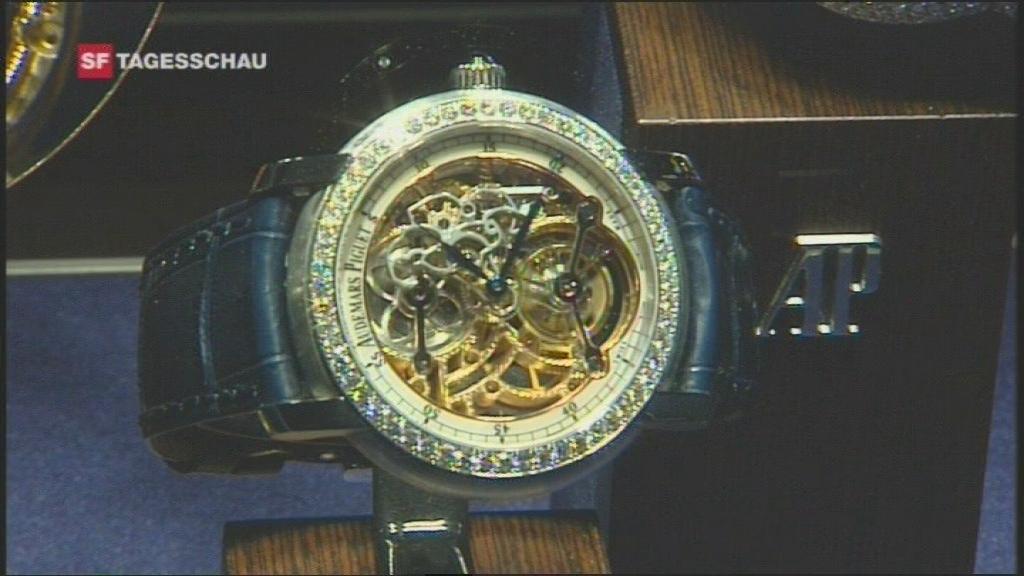Open markets “the only chance” for poor countries

The head of the World Trade Organization says globalisation has benefited developing countries and protectionism will not solve the world economic crisis.
Pascal Lamy is at an Organisation for Economic Co-operation and Development (OECD) forum in Paris this week, where a roundtable speaker compared the current downturn with the start of the depression in the early 1930s.
In an interview with swissinfo.ch after the discussion, called “After the crisis, keeping markets open”, Lamy said the economic decline should not induce people to surrender to the lure of sealing their borders to trade.
In difficult times, protectionism can help stave off other economic setbacks but open markets are the only way for many countries to generate enough wealth to lift their people out of poverty.
International trade, he says, can also provide sustainable solutions to protect the environment while fostering economic growth.
swissinfo.ch: Globalisation made a world crisis out of an American crisis. So why not finally say every man for himself? Wouldn’t everyone come out better?
Pascal Lamy: It’s clear that globalisation globalised the crisis, but for many decades globalisation also globalised growth while lifting hundreds of millions of people out of poverty. Did this crisis have to be global? I think not, but we must not go back to every man for himself. Globally, in the medium-to-long term, this scheme is less efficient in terms of creating wealth than one in which both sides trade where they have an interest in trade.
Look at Switzerland. Jobs in the export sector are better paid than others. It is not a coincidence that Switzerland exports to areas where it is more competitive. Being more productive, innovative and efficient allows people to be better paid. History as well as economic science show open systems create more wealth than closed ones.
swissinfo.ch: The logic doesn’t convince everyone. Do you feel protectionist temptations stirring governments, opinions or political forces?
P.L.: Of course. And I understand them very well. When things are tough, you need protection. But the question is whether trade protection or border protection actually protect. In truth it does not. If you start to protect your imports, your neighbour will do the same. Your neighbour’s imports are your exports, so you are going to win a little with imports and lose a lot with exports. It does not work.
Of course you need protection. Where there are social security systems, retraining, social mobility, we must reach into this toolbox. That is the case for a country like Switzerland. But you mustn’t forget that 80 per cent of the world population does not have these social safety nets. For them, open markets are to some extent their only chance.
Social security in many developing countries is open-market security.
swissinfo.ch: The forum spoke again this year a lot about the environment. World trade means a considerable amount of transporting merchandise with significant environmental costs. It there not a balance to be found between trade development and environmental protection?
P.L.: Certainly. It’s true that international commerce creates transportation. Let’s remember that 90 per cent of shipments are done by sea, which pollutes the least compared with rail or air.
Here’s an example: If I am a Saudi and I no longer have enough water to cultivate wheat, I must turn to international trade. When Saudi Arabia was producing wheat, it was an ecological mistake. Thanks to the fact that wheat can be produced elsewhere and that the country can import it from countries that have water, international trade has solved an environmental problem. It is not black and white. At the end of the day, it largely depends – for transportation – on whether energy prices correctly account for CO2 emissions.
The question is in the hands of international negotiators who are going to have to come to an agreement at the climate conference in Copenhagen. Experience has shown that if they agree, then there is no major problem with international trade rules.
swissinfo.ch: For fair competition, should we not impose on a country like China the same social, wage and environmental conditions as those of developed countries?
P.L.: It’s always easy to think that we can place our own conditions on everyone but the world doesn’t work that like. We are on a planet where international regulations need to be negotiated. They can’t be imposed.
Each country in the OECD has the right to protect their environment as long as it is done in a non-discriminatory way. In terms of social matters, there are certain fundamental rules concerning worker rights set by the International Labour Organisation that each member of that group must respect.
If the question is, are the Chinese paid less than Europeans? The answer is yes. It is a question of productivity. The Chinese as a whole are less productive than Europeans because they are less qualified and they have invested less in their means of production, in their machines. That said, the salary of the Chinese has not gone down over the last ten years. It has gone up. The Chinese have now become consumers, meaning importers of the goods that Europeans export to them. It is not a zero-sum game.
Marc-André Miserez in Paris, swissinfo.ch (Translated from French by Tim Neville)
Angel Gurria, secretary general of the OECD, wrote to Switzerland to say in the future member states of the OECD will be informed prior to the G20 or any other organisation of any action concerning them.
“We now have a guarantee that allows you to be confident,” said Economics Minister Doris Leuthard on Wednesday upon her arrival in Paris for the OECD ministerial conference.
Switzerland had been angered for being included on a list “grey list” of tax havens at a G20 meeting.
After releasing figures on unemployment, the OECD published this week figures on general economic perspectives.
Recovery: Most major countries outside the OECD seem to have started bouncing back, particularly China. In the United States, signs are increasingly pointing to a recovery in activity in the second half of the year. In Europe, however, the situation remains murky.
Switzerland: The OECD forecast are now coming more in line with that of Swiss experts with a decline in GDP by 2.7% and not 0.2% for 2009 as previously announced. In 2010 the drop should not be more than 0.2%.
No triumph: The recovery remains fragile, the OECD warns. Efforts by states to sustain the economy should not be stopped, including the fight against unemployment, which is now close to 10%. That is the worst level since the 1970s.
Reforms: Regulations and supervision should be strengthened to limit the risk of new financial crises. That will face resistance, but the OECD says “they must be made before the memory of the crisis becomes too blurred”.
Citizen cash machines: The exceptional measures taken by governments have increased public debt “dramatically”. To put things back into balance, states must agree to “budgetary consolidation efforts” that “reduce public spending that does not support growth”. When it is necessary to increase the tax burden, the OECD recommends favouring broad-based taxes that are paid by the most people, such as a sales tax.

In compliance with the JTI standards
More: SWI swissinfo.ch certified by the Journalism Trust Initiative






You can find an overview of ongoing debates with our journalists here. Please join us!
If you want to start a conversation about a topic raised in this article or want to report factual errors, email us at english@swissinfo.ch.